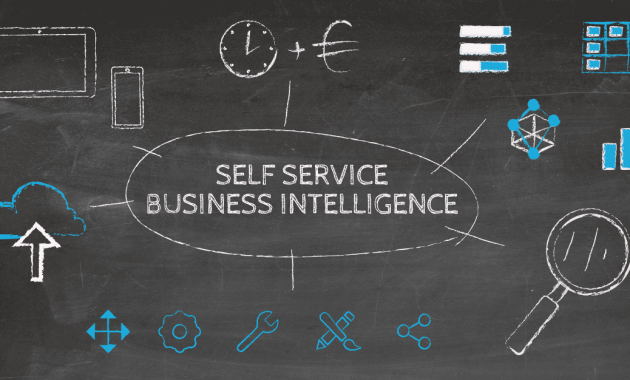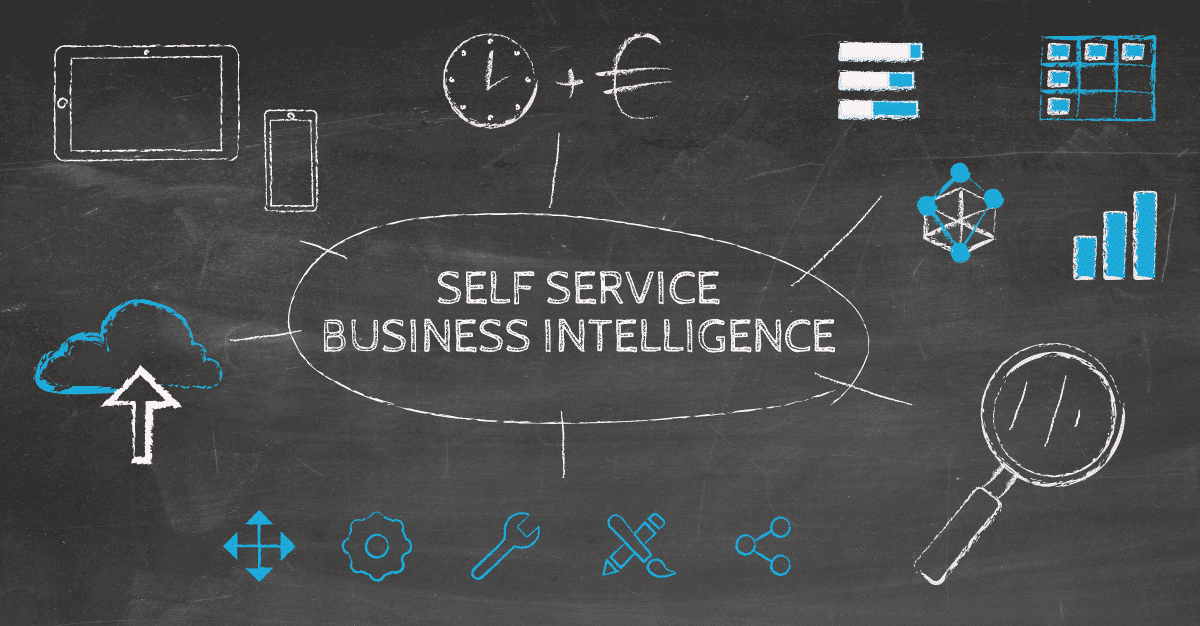
Making Real Decisions: The Power of Self-Service Business Intelligence Software
In today’s data-driven world, businesses are drowning in information. The challenge isn’t just collecting data; it’s transforming that raw data into actionable insights. This is where self-service business intelligence software steps in. It empowers individuals and teams to analyze data, create reports, and make informed decisions without relying heavily on IT or data science specialists. This article delves into the world of self-service business intelligence software, exploring its benefits, key features, and how it’s revolutionizing decision-making across various industries.
Demystifying Self-Service Business Intelligence
Self-service business intelligence (BI) software is essentially a user-friendly platform. It allows business users to access, explore, and analyze data. The core principle is to put the power of data analysis directly into the hands of the people who need it most. This reduces reliance on IT departments or specialized analysts. Users can create their own dashboards, reports, and visualizations. This enables them to quickly understand trends, identify opportunities, and address challenges.
Traditional BI often involves a lengthy process. It requires IT to build reports and dashboards. This can be time-consuming and inflexible. Self-service BI changes this paradigm. It provides intuitive interfaces, drag-and-drop functionality, and pre-built templates. This enables users to generate insights quickly. This agility is crucial in a fast-paced business environment. The ability to rapidly analyze data allows for quicker responses to market changes and customer needs.
Key Features of Effective Self-Service BI Software
Several features are essential for self-service business intelligence software to be effective. Understanding these features helps businesses choose the right solution. It ensures they can leverage the full potential of their data.
- Data Connectivity: The ability to connect to various data sources is crucial. This includes databases, cloud services, spreadsheets, and more. The software should support a wide range of data connectors.
- Data Visualization: Robust data visualization tools are essential. These tools transform complex data into easy-to-understand charts, graphs, and dashboards. This makes it easier to identify patterns and trends.
- Data Preparation: Data often needs cleaning and transformation before analysis. This includes removing duplicates, correcting errors, and formatting data. The software should offer data preparation capabilities.
- User-Friendly Interface: The interface should be intuitive and easy to navigate. Drag-and-drop functionality and pre-built templates are highly beneficial.
- Collaboration Tools: Features that enable users to share insights and collaborate with others are important. This includes the ability to share dashboards and reports.
- Mobile Access: The ability to access data and insights on the go is increasingly important. Mobile BI allows users to stay informed regardless of their location.
- Security Features: Strong security features are essential to protect sensitive data. This includes user access controls and data encryption.
Benefits of Implementing Self-Service BI
The advantages of adopting self-service business intelligence software are numerous. They span across various aspects of business operations. These benefits contribute to improved decision-making, increased efficiency, and enhanced competitiveness.
- Faster Decision-Making: Users can analyze data and generate insights quickly. This leads to faster decision-making.
- Improved Data Literacy: Self-service BI empowers users to become more data-literate. They better understand the data and its implications.
- Reduced Reliance on IT: By enabling users to perform their own analysis, the burden on IT departments is reduced.
- Increased Agility: Businesses can respond more quickly to market changes and customer needs. This is due to the speed of data analysis.
- Cost Savings: Reduced reliance on IT and specialized analysts can lead to significant cost savings.
- Better Collaboration: Collaboration tools facilitate the sharing of insights and foster a data-driven culture.
- Enhanced Accuracy: Empowering users to access and analyze their own data can lead to more accurate insights.
Real-World Applications Across Industries
Self-service business intelligence software is transforming how businesses operate across various sectors. Its versatility makes it a valuable tool for organizations of all sizes. Here are some examples:
- Retail: Retailers use BI to analyze sales data. They optimize inventory, personalize marketing campaigns, and improve customer experience.
- Healthcare: Healthcare providers leverage BI to analyze patient data. They improve patient outcomes, optimize resource allocation, and reduce costs.
- Finance: Financial institutions use BI to analyze financial data. They identify risks, detect fraud, and improve investment strategies.
- Manufacturing: Manufacturers use BI to analyze production data. They optimize processes, improve efficiency, and reduce waste.
- Marketing: Marketers use BI to analyze campaign performance. They optimize marketing spend and improve ROI.
- Human Resources: HR departments use BI to analyze employee data. They improve employee retention, optimize hiring processes, and manage workforce planning.
Choosing the Right Self-Service BI Software
Selecting the right self-service business intelligence software is crucial for success. There are several factors to consider during the evaluation process. These factors ensure the chosen solution meets the specific needs of the business.
- Data Sources: Ensure the software can connect to all relevant data sources. It should support the data formats used by the business.
- User Interface: The interface should be intuitive and easy to use. Consider the skill levels of the intended users.
- Features: Evaluate the available features. They should align with the business’s analytical needs.
- Scalability: The software should be able to scale as the business grows. Consider the potential for increased data volumes.
- Security: Ensure the software offers robust security features. This protects sensitive data from unauthorized access.
- Pricing: Compare pricing models and ensure the software fits within the budget. Consider the total cost of ownership.
- Support: Evaluate the level of customer support offered by the vendor. Ensure it meets the business’s needs.
Overcoming Challenges and Best Practices
While self-service business intelligence software offers numerous benefits, there can be challenges. Businesses can overcome these challenges by following best practices. Careful planning and implementation are key to success.
- Data Governance: Establish clear data governance policies. This ensures data quality, consistency, and security.
- User Training: Provide comprehensive training to users. This helps them understand the software and its capabilities.
- Data Quality: Implement data quality checks and processes. This ensures the accuracy and reliability of the data.
- Security Measures: Implement strong security measures. Protect sensitive data from unauthorized access.
- Collaboration and Communication: Encourage collaboration. Foster communication among users.
- Iterative Approach: Start with a pilot project. Gradually roll out the software across the organization.
The Future of Self-Service BI
The future of self-service business intelligence software is bright. Advancements in technology are continually shaping the landscape. These advancements are making BI even more accessible and powerful.
- Artificial Intelligence (AI) and Machine Learning (ML): AI and ML are being integrated into BI platforms. These technologies automate insights. They also predict future trends.
- Natural Language Processing (NLP): NLP allows users to interact with BI platforms using natural language. This makes data analysis easier.
- Cloud-Based Solutions: Cloud-based BI solutions are becoming increasingly popular. They offer scalability, flexibility, and cost-effectiveness.
- Mobile BI: Mobile BI continues to evolve. It provides users with access to data and insights on the go.
As technology advances, self-service business intelligence software will become even more integral. It will empower businesses to make more informed decisions. This will lead to greater success.
Conclusion: Embracing Data-Driven Decisions
Self-service business intelligence software is more than just a tool. It’s a strategic enabler. It empowers businesses to make data-driven decisions. By providing accessible and intuitive platforms, it democratizes data analysis. It puts the power of insights into the hands of those who need it most. Businesses that embrace self-service BI are better positioned. They can navigate the complexities of the modern business environment. They can thrive in a rapidly changing world. The ability to make real decisions, based on real data, is the key to future success. [See also: Data Visualization Best Practices] [See also: Choosing the Right BI Tool]

